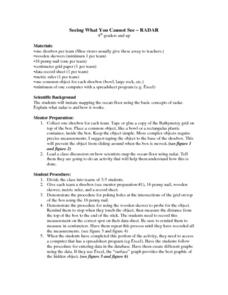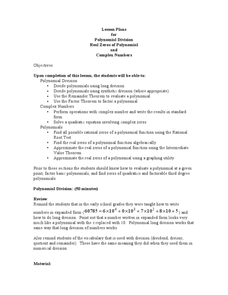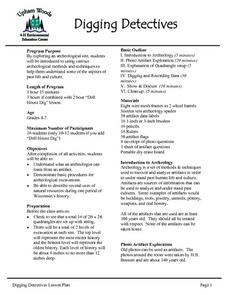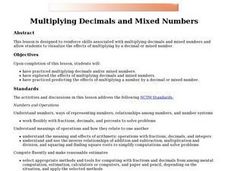EngageNY
Adding and Subtracting Rational Expressions
There's a fine line between a numerator and a denominator! Learners find common denominators in order to add and subtract rational expressions. Examples include addition, subtraction, and complex fractions.
Curated OER
How Many Cells Are Born in a Day?
Students predict the number of cells after a series of cell divisions. In this cells lesson students create a graph of their results and create a patterned drawing.
Curated OER
Seeing What You Cannot See--RADAR
Student imitate mapping the ocean floor using the basic concepts of radar. Then they explain what radar is and how it workds. All of their measurements are recorded on a data sheet. Then the data is entered into a spreadsheet program. A...
Curated OER
Polynomial Divisions
Students factor polynomials and use long division t solve problems. In this algebra lesson, students find the zeros of polynomials by synthetic and long division. They perform operation using complex numbers.
Curated OER
Tower Power
Students explore basic building and engineering concepts by constructing a structure that supports weight. They demonstrate an understanding of basic business concepts by estimating the cost and value of a building.
Curated OER
Digging Detectives
Students demonstrate basic procedures for archeological excavations. They explore an archeological site, students using various archeological methods and techniques to determine some of the aspects of past life and culture.
Curated OER
DNA AND BLOOD TYPING
Students list three descriptive characteristics and three functions of DNA, describe two ways that genetics is important in a forensic investigation, and list the four major human blood types.
Curated OER
Multiplying Decimals and Mixed Numbers
Students multiply decimals and/or mixed numbers. They explore the effects of multiplying decimals and mixed numbers. They practice estimating answers when a number is multiplied by a decimal or mixed number.
Curated OER
What Does My Bacteria Look Like?
Students identify Gram positive and Gram negative bacteria using staining techniques. Students research importance of identification of bacterial types in diagnosing bacterial diseases.










